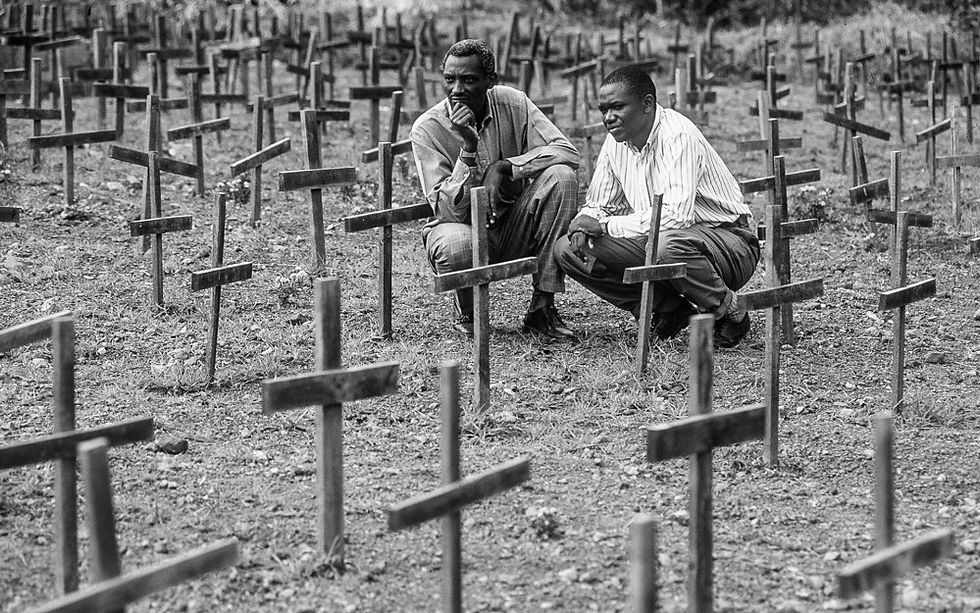Moderates: The First Line of Defence in Genocide Prevention
- Staff Contributor
- Nov 29, 2021
- 3 min read
Genocide Watch’s Ten Stages of Genocide details the predictable processes that lead up to genocide as well as the preventive measure that can be taken to stop them. Stage 6: Polarization represents a critical juncture where extremists work to differentiate and drive majority and minority groups apart. These types of campaigns allow genocidal leaders to more easily carry out violence against minorities with little to no opposition from within their own group. At this stage, both the role of moderates in genocide prevention, and the threat posed towards moderate voices increase exponentially
THE ROLE OF MODERATES IN PREVENTING GENOCIDE
Moderates are all people who are opposed to extremism. They stand against the use of hateful rhetoric and the implementation of discriminatory policies and oppose acts of violence and terrorism. They are often civil society leaders and also members of the perpetrators' own group, such as human rights activists, lawyers, academics, public intellectuals, and religious leaders. For instance, liberal priests and pastors in Germany in the aftermath of Hitler’s rise to power were among those most ardently opposed to Nazism.
As moderates play a vital role in combatting extremist ideology and identifying early signs of genocide, they are often the first to be arrested or killed. The targeting of moderates within the perpetrator group complicates the traditional binary of perpetrators and victims. The 1994 Rwandan genocide perpetrated by the Hutu extremist-led government against the Tutsi minority also saw widespread killings of moderate Hutus. The Hutu Prime Minister Agathe Uwilingiyimana and the Hutu President of the Supreme Court Joseph Kavaruganda were among the first to be murdered.
THE TARGETING OF MODERATES
Today, moderate figures around the world are facing unprecedented levels of persecution and harassment. Malicious propaganda targets community leaders, lawyers, journalists, and other human rights defenders. Government-led crackdowns on civil society organisations and mass data surveillance have now become rampant. Much of this assault has been led by authoritarian leaders, but it is not limited to such illiberal regimes.
This assault is often couched in the language of national security and counter-terrorism. Accusing moderates of terrorism on flimsy grounds allows for easy detention and incarceration for prolonged periods. Most of the time, they remain in jail as undertrials without any conviction. The death of Indian activist Stan Swamy in prison serves as a haunting example of how easily anti-terror laws can be misused to persecute moderates simply for opposing the violence committed by the state. If legal harassment falls short, extrajudicial executions carried out by mobs, paramilitary, and vigilante groups remain a time-tested tool for attacking moderates and creating an atmosphere of fear.
While moderates have long been targets, the tools available to governments and leaders to silence them has reached unprecedented levels. The massive growth of surveillance technology has put the lives of all those who stand up against genocidal leaders in imminent danger, inevitably making it easier for these regimes to carry out future violence.
The latest Pegasus revelation has brought to the fore this fragile state of affairs and the extent to which technology can aid authoritarian leaders. According to an investigation led by The Washington Post and 16 other media partners, around 50,000 phone numbers around the world were on a potential surveillance target list featuring phone numbers of human rights activists, journalists, and opposition leaders spanning 40 countries.
PROTECTING MODERATES
The protection of moderates is not going to be an easy task and will require the cooperation between state actors and non-state actors both nationally and internationally. On a national level, the courts must refuse to bow to oppressive regimes and carry out legal sanctions against leaders who try to silence the moderates in a society. Governments of foreign countries wield power through the threat of economic and political sanctions and must not be afraid to use them to protect citizens being hounded by genocidal states.
The only way then to prevent genocide and protect moderates is to raise awareness and to build a strong global solidarity network aimed at ending genocide.
The views and opinions expressed are those of the authors and do not necessarily reflect the official policy or position of Genocide Watch
.png)

Kommentare